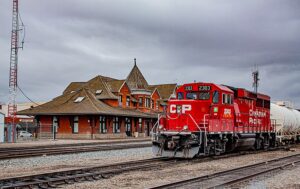As a result of the attack on Iran, nitrogen fertilizer at the port of New Orleans has seen an increase in price this week. Urea prices for barges in New…
Canadian Government Orders Arbitration to End Rail Stoppage
The Associated Press’s Rob Gillies and Josh Funk reported Thursday evening that “freight trains in Canada could be running again within days after the government forced the country’s two major railroads into arbitration with their labor union Thursday, a move aimed at averting potentially dire economic consequences across the country and in the U.S. if the trains are sidelined for a long period.”
“The government’s action came more than 16 hours after Canadian National and CPKC locked out workers over a labor agreement impasse. Both railroads said they would work to get trains moving again as soon as possible,” Gillies and Funk reported. “The union representing 10,000 engineers, conductors and dispatchers responded angrily to the order, accusing the railroads of intentionally creating a crisis to force the government to intervene.”
“Labour Minister Steven MacKinnon announced the decision to order the arbitration at a news conference Thursday. MacKinnon said he expects the trains will resume moving within days. Ending the lockouts is the first step,” Gillies and Funk reported. “MacKinnon said the government wanted to give negotiations every chance to succeed, but ultimately the economic risk was too great to allow the lockouts to continue. He had declined to order arbitration a week ago.”
NPR’s Ayana Archie reported that “CN said it lifted its lockout Thursday evening in order to ‘expedite the recovery of the economy,’ but still has not reached a new collective bargaining agreement with Teamsters. CPKC said it was prepared to resume its operations, but claims Teamsters did not want to discuss the matter and plans to challenge the constitutionality of MacKinnon’s order.”

Bloomberg’s Brian Platt and Monique Mulima reported that “business groups in Canada and the US have been calling on the Canadian government to intervene, as the lockout disrupted the countries’ interconnected supply chain. Commodities like coal, wheat, fertilizer and lumber depend on the railways, and there are few shipping alternatives.”
How US Ag Would Have Been Affected
Roll Call’s Valerie Yurk reported that “agriculture organizations have warned that a stoppage would halt the flow of key agricultural products, like grain and feedstocks for poultry and cattle. The Canadian Federation of Agriculture wrote in a letter last week that the companies had already halted shipments of ‘hazardous items’ including fertilizers ahead of potential work stoppage.”
“Canada is a key source of fertilizer for U.S. farmers,” the American Farm Bureau’s Daniel Munch reported. “…More than 85% of fertilizer trade between the U.S. and Canada is transported by rail, with the remainder handled by trucking (12%) and waterborne vessels (3%).”
“Disruptions to railway access between the U.S. and Canada could severely jeopardize farmers’ ability to secure essential inputs critical for crop growth,” Munch reported. “This is particularly concerning with nitrogen fertilizer, a key input for many crops, with a significant portion applied in the fall.”
Munch also reported that a rail stoppage would affect U.S. agriculture exports to Canada, which was the leading destination for U.S. “ethanol and barley, with 76% of U.S. barley exports and 44% of ethanol exports heading north of the U.S. border” in 2023.
“Canada also ranked as the fourth-largest market for U.S. soybean meal and rice, and the fifth largest for corn,” Munch reported. “Interestingly, a portion of these exports is transported to Canada, then moved westward across the country before being re-exported through Pacific Northwest ports on both sides of the border. This complex logistical flow means that a Canadian rail strike could disrupt not only trade with Canada but also with key markets in Asia and Oceania, further amplifying the potential risks and impacts on U.S. agricultural exports.”
Most Companies Can Withstand Short Stoppage
Gillies and Funk reported that “most businesses will probably have enough supplies on hand and enough room to store their finished products to withstand a brief disruption. But ports and other railroads will quickly become clogged with stranded shipments that Canadian National and CPKC won’t pick up.”





